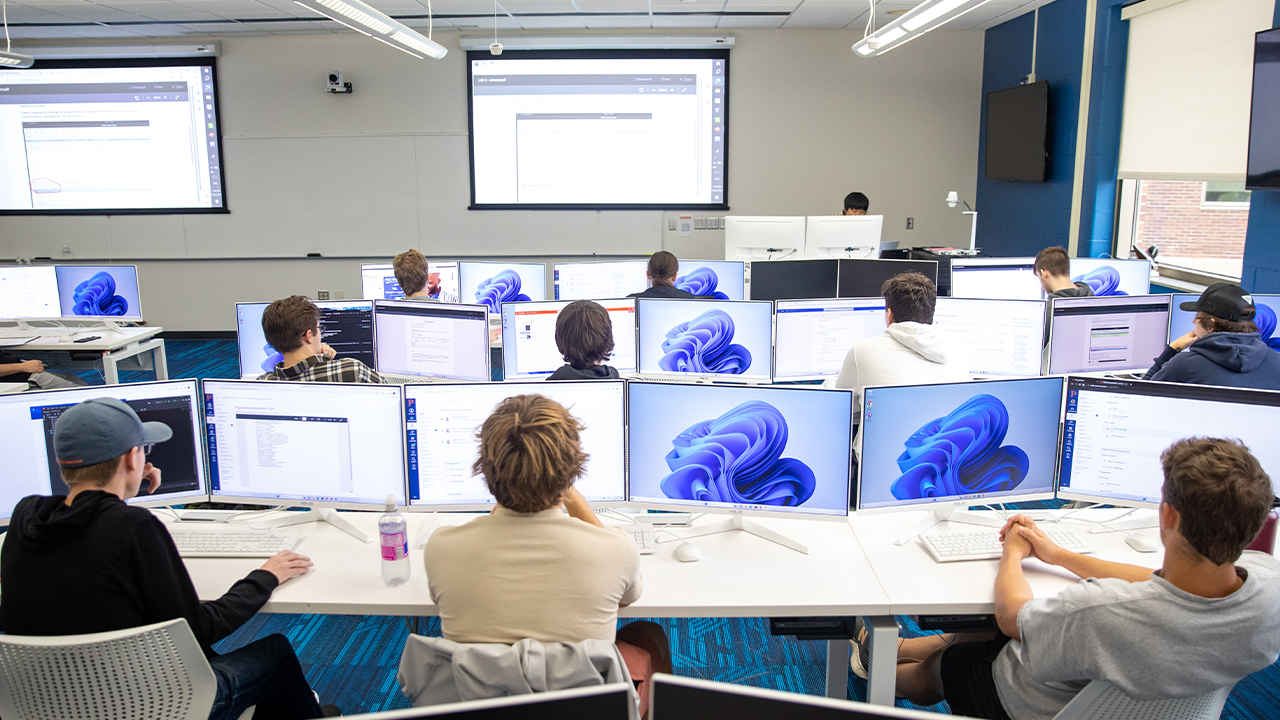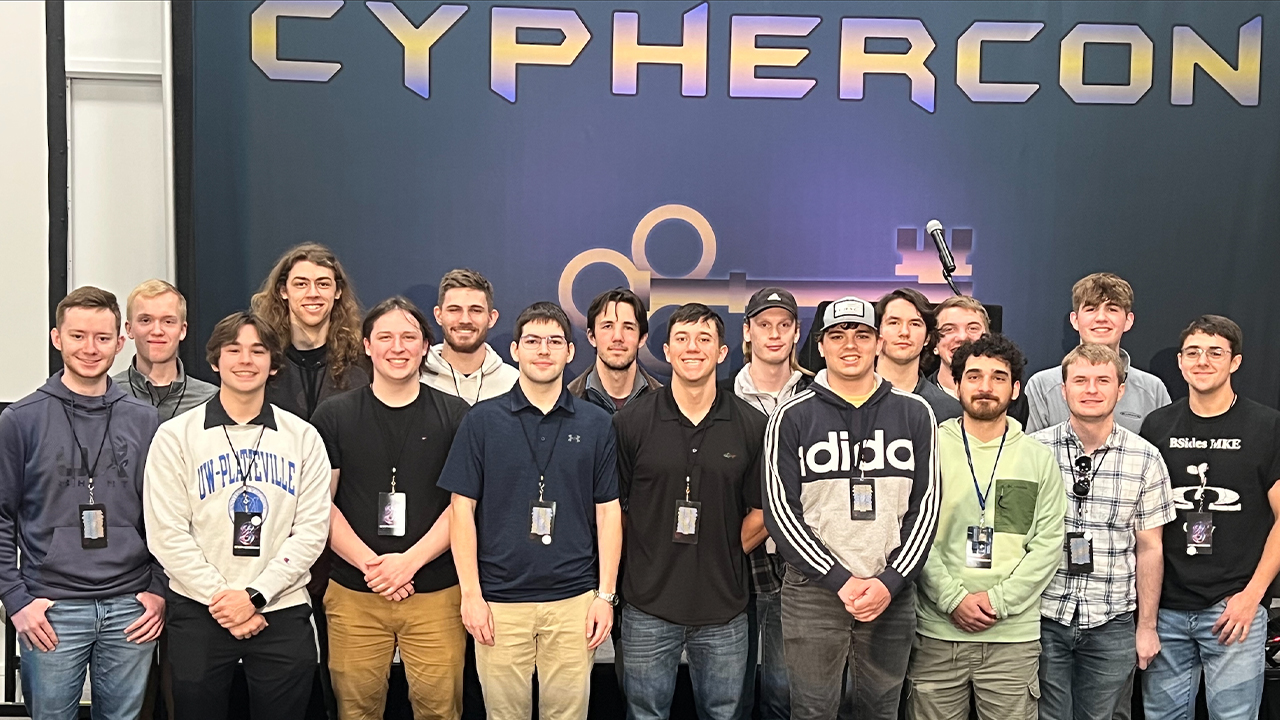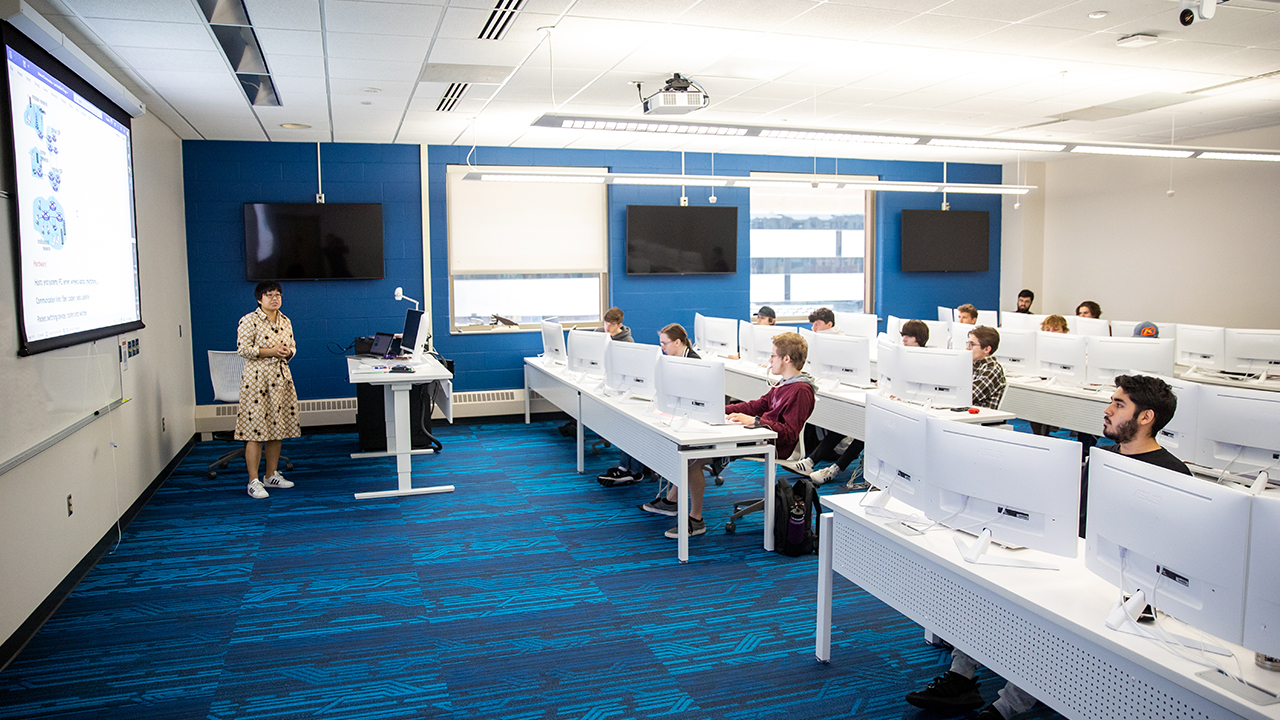



Two teams from the Cybersecurity Club at the University of Wisconsin-Platteville recently achieved an impressive milestone, both placing in the top 3% out of more than 10,000 teams worldwide in picoCTF 2025, one of the most prestigious cybersecurity competitions in the world. The competition tested participants on real-world cybersecurity challenges, including cryptography, reverse engineering and web exploitation. This competition featured not only college teams but also seasoned cybersecurity professionals. This student organization is more than a club; it’s a training ground for what lies ahead for these students once they leave campus.
“Cybersecurity competitions, commonly known as Capture the Flag (CTF), give students the opportunity to solve problems based on real-world scenarios, often presented in a gamified format,” explained Dr. Mohammad Ashrafuzzaman, team advisor and assistant professor of computer science and software engineering. “This makes the learning process entertaining, diverse, technically deep and competitively challenging. These competitions are not only excellent tools for talent development, but also highly effective for talent exposition and showcasing.”
The Cybersecurity Club helps students go beyond the classroom. In a supportive, peer-driven space, they learn by trying, failing and trying again. Along the way, they build resilience, sharpen problem-solving skills and grow as communicators and collaborators.
"We meet weekly, and students are encouraged to present on various topics they are learning and passionate about,” said senior Parker Stork from West Des Moines, Iowa, who is double majoring in cybersecurity and computer science with a minor in Spanish. “This has been invaluable for job interviews, as it helped me build confidence speaking in front of industry professionals. It has made a significant difference in my career preparation."
Stork, the president of the Cybersecurity Club, was a member of one of the two UW-Platteville teams that ranked in the top 3% in the picoCTF competition. Now preparing to graduate, he has already accepted a position as a network technician with Iowa Solutions and is set to return home.
"I don’t think I would have landed a job like this without the Cybersecurity Club,” said Stork. “The club offers a lot of valuable experiences, and many companies list 'participated in CTF competitions' as a preferred skill in their job descriptions.”
The Cybersecurity Club has had an eventful month, highlighted by their participation in CypherCon in Milwaukee, a leading cybersecurity conference that gathered professionals and experts from the industry. The event offered valuable networking opportunities, enabling the team to engage with industry leaders while also taking part in various cybersecurity challenges.
“I believe these students are not only bright, but also very hardworking,” said Ashrafuzzaman. “They have already proven themselves in various CTFs. At the Wisconsin Governor's Cybersecurity Summit last October, four of our teams placed first, second, fourth and seventh among 28 teams, most of which were composed of cybersecurity professionals with many years of experience.”
The club’s global ranking underscores the program’s impact
While these accomplishments are remarkable on their own—especially considering the club is only a year and a half old—they reflect a much larger story. Behind the club’s success is the strength of UW-Platteville’s cybersecurity program, which provides students with the academic support and cutting-edge resources they need to excel in an increasingly complex digital world.
“What really sets our cybersecurity program apart is how hands-on and applied it is,” said Dr. Philip Parker, dean of the College of Engineering, Mathematics and Science. “Our students are in the labs solving real problems and gaining experience in network defense, digital forensics, penetration testing and secure software development. That kind of applied learning, paired with dedicated faculty who bring deep industry know-how, really prepares students to shine in competitions like this.”
UW-Platteville launched the first cybersecurity program in the state, setting a strong foundation for students pursuing careers in this high-demand field. The cybersecurity program, offered through the Department of Computer Science and Software Engineering, is designed to prepare students for real-world challenges. The department has three majors, including computer science, cybersecurity and software engineering, along with minors in both cybersecurity and computer science. Students also have the option to continue their education by earning a Master of Science in Cybersecurity, which is 100% completely online.
Cutting-edge technology provides a superior space to learn
The Cybersecurity Lab, which opened last year, empowers students with hands-on experience in key areas such as penetration testing, malware analysis and digital forensics. It also teaches them how to defend against cyber threats targeting both organizational and personal data. The lab features brand-new equipment, and more importantly, it’s equipped with state-of-the-art computers and advanced presentation technology. Students have said the space is visually impressive and creates a dynamic, engaging learning environment.
Dr. Ron Meissen, a UW-Platteville alumnus, has played an instrumental role in advancing the university’s cybersecurity program, contributing to the creation of the Cybersecurity Lab, providing additional funding to support the Cybersecurity Club and working with the Computer Science and Software Engineering (CSSE) Advisory Group.
“Once I became aware of the rapidly growing demand for cybersecurity experts—and recognized the excellent position UW-Platteville holds as the first university in Wisconsin to offer a cybersecurity degree—I was all in,” exclaimed Meissen. “UW-Platteville gives students a tremendous opportunity to thrive in this high-demand field, and they’re proving it with the impressive results of their recent competition.”
The achievements by the club undoubtedly highlight the strength and momentum of UW-Platteville’s growing cybersecurity program — but it’s the students who reflect its true power.
“The experience you gain through the Cybersecurity Club shows employers that your interest in cybersecurity goes beyond the classroom,” said Stork. “The hands-on skills and knowledge I gained from my degrees at UW-Platteville also prepared me well and translate directly into the professional world.”